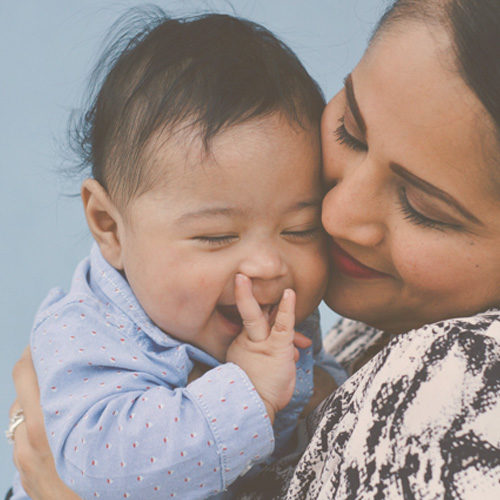Saying Mama

The experience of several mothers indicates that one of the most common first words for a baby is ‘Mama’ .
Why is it so often ‘Mama’?
Firstly, there are various formats of communication possible for Your Child:
- Newborn infants use crying to communicate when they need something and remember their mothers’ voices.
- Once reaching the age of 1-4 months, the little one will start smiling, laughing, or voice out vowels, such as “ooh”, or “ah”, while during that time, Your Child will also remember different words, such as main words used when you talk to the little one, such as the name, parents’ names, or even names of nearby objects.
- By the age of 5 – 7 months, Your Child will most likely voice out 1 syllable words.
- At 8 – 10 months, Your Child will utter out babbles or repetitive sounds without knowing their meaning. These are usually words that are easy to voice out, or could be words that Your Child hears a lot from you. Thus, it is not surprising how “mama”, which means mother, commonly becomes the first word children speak.
- At age 12 months, babies will start understanding the meaning of words used for communication as they refer to surrounding objects. In addition, you may observe Your Child starting to use hand gestures as well, such as pointing towards toys or raising hands as a sign of wanting to be carried. Essentially, at this age, when Your Child says ‘mama’, you will notice the little one is clearly calling for you.
How can you help your baby improve on these skills?
You can support Your Child language development by talking to the little one consistently, where you can start as early as after birth. While providing your concentration towards conversations with Your Child is integral, you should maintain eye contact, or what is called a face-to-face interaction. Also, interchanging between high and low pitch voices, and speaking slowly and clearly, will allow Your Child to have fun in learning different voices.
You could even ask Your Child questions while waiting for answers, in which Your Child could reply by crying or voicing out something to you. Singing, reading books, and using hand gestures as you play can also be essential for keeping Your Child interested and understanding more easily. However, it is not encouraged to use words without meanings when playing because Your Child will, later on, develop and start remembering those words.
Nevertheless, different children may develop speaking skills at different stages. Therefore, it is totally normal that your child could start speaking later than your friend’s child. But at this moment, the most important thing to remember is that you are the one who understands your child the best.
If you notice that your child has problems in communication development or hasn’t portrayed any signs of speaking as Your Child approaches 2 years old, you should seek consultation with an expert. In some cases, language skills are delayed due to excessive screen time.
Verified:
Ketsupa Jirakarn (Mental health specialist) (31 March 2021)



